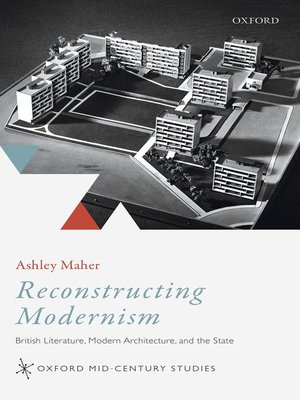Reconstructing Modernism
ebook ∣ British Literature, Modern Architecture, and the State · Oxford Mid-Century Studies
By Ashley Maher

Sign up to save your library
With an OverDrive account, you can save your favorite libraries for at-a-glance information about availability. Find out more about OverDrive accounts.
Find this title in Libby, the library reading app by OverDrive.



Search for a digital library with this title
Title found at these libraries:
| Library Name | Distance |
|---|---|
| Loading... |
Reconstructing Modernism establishes for the first time the centrality of modernist buildings and architectural periodicals to British mid-century literature. Drawing upon a wealth of previously unexplored architectural criticism by British authors, this book reveals how arguments about architecture led to innovations in literature, as well as to redesigns in the concept of modernism itself. While the city has long been a focus of literary modernist studies, architectural modernism has never had its due. Scholars usually characterize architectural modernism as a parallel modernism or even an incompatible modernism to literature. Giving special attention to dystopian classics Brave New World and Nineteen Eighty-Four, this study argues that sustained attention to modern architecture shaped mid-century authors' political and aesthetic commitments. After many writers deemed modernist architects to be agents for communism and other collectivist movements, they squared themselves—and literary modernist detachment and aesthetic autonomy—against the seemingly tyrannical utopianism of modern architecture; literary aesthetic qualities were reclaimed as political qualities. In this way, Reconstructing Modernism redraws the boundaries of literary modernist studies: rather than simply adding to its canon, it argues that the responsibility for defining literary modernism for the mid-century public was shared by an incredible variety of authors—Edwardians, modernists, satirists, and even anti-modernists.







